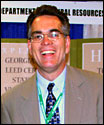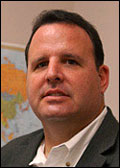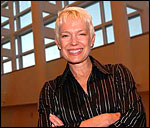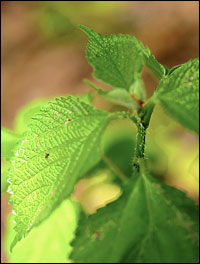This week we’ve profiled several cities that are changing the way their residents live, work, and get around — all with an eye toward fighting climate change and building a more sustainable future. So what can you do if your community hasn’t seen the light? We asked our sources for advice, and here’s what they had to say.

Kimber Lanning.
“Buy local whenever possible. Whether you’re hiring someone to work on your air conditioner, buying dog food, or buying produce, buy it from your neighbor whenever you can. If you think it’s more expensive, think about a city with nothing but part-time jobs with few benefits for the next generation. Now that’s expensive!”
— Kimber Lanning, founder, Local First Arizona
“Get educated. Residents should try to learn as much as possible about the particular natural, economic, and social conditions of the place where they live, and they should always consider how decisions in one dimension will affect the other two.”
— Christine Shenot, project manager, ICMA Livable Communities

Dennis Creech.
“Lobby elected officials to provide incentives to the private sector for sustainable development, including fast-track permitting for green buildings, density bonuses, and property tax ‘relief’ for energy upgrades.”
— Dennis Creech, executive director, Southface Energy Institute

James Elsen.
“Get out of your car. Every city in the country struggles with getting people to leave their cars behind. Walk, bike, use public transport, or skip the trip. You’ll have a direct positive impact on helping your city clear the air and lower greenhouse-gas emissions, while saving yourself some gas money, decreasing your traffic stress, and getting some exercise as a bonus. Imagine: if we all just did this once a week, the impact would be huge.”
— James Elsen, founder and CEO, SustainLane

Jay Golden.
“Engage K-12 schools to include sustainability sciences into their curriculum. Children have a great capacity to affect change. When they recognize how things can be done better in our communities, they are able to harness the enthusiasm that is inherent in youth and can question the decisions we as adults make without being insulting. Additionally, we find that sustainability sciences is a great platform to get our youth excited about science, technology, math, and engineering — similar to what the space program did when I was a child.”
— Jay Golden, assistant professor, Arizona State University School of Sustainability
“Talk to your local leaders. Sustainability is such a hot issue right now that many politicians on both sides of the fence are incorporating it into their platforms and positions. However, once another hot issue comes along, these ideas could quickly fall to the wayside, if citizens aren’t vigilant. It’s very important that citizens tell their elected and appointed officials how important it is to them to make the city more sustainable — and that they want to see a long-term plan established that will not fall victim to politics or leadership changes.”
— Meghan Sharp, project manager, ICMA Livable Communities

Dean Brennan.
“Educate yourself — go online and collect information; learn what other communities are doing and talk to staff in other communities; find the local experts in your community and ask them to make presentations to city staff and to the community. Use that information to focus your efforts to determine what your community can accomplish. Don’t hesitate to ask for help — we’ve found that there are a lot of people out there who are very committed to the sustainability movement and will be willing to help — for free!”
— Dean Brennan, principal planner, City of Phoenix

Carol Coletta.
“Get out of your car. That’s the greenest thing you can do.”
— Carol C. Coletta, host/producer, Smart City Radio, president, CEOs for Cities


